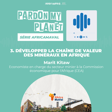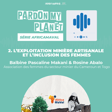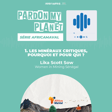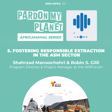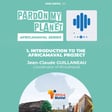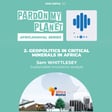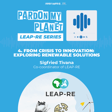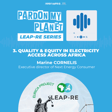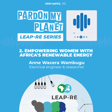Become a Creator today!Start creating today - Share your story with the world!
Start for free
00:00:00
00:00:01

Introduction to renewable energy in Africa
In the opening episode of our series, Leonard Lévêque, project manager at LGI and co-coordinator of LEAP-RE, provides an overview of the renewable energy landscape across the African Union. Leonard emphasises the crucial importance of developing renewable energy sources in Africa, not just to meet growing energy demands, but as a pivotal strategy for sustainable development.
More information on: lgi.earth/podcast
Transcript
Introduction to Pardon My Planet
00:00:10
Speaker
Hello, welcome to Pardon My Planet podcast. I'm Anshalot, your host, and today we will talk about renewable energy in the African Union countries. It's actually a series that you will hear on this podcast show, so please stay tuned also for the next episodes and lot many exciting stories and valuable insights on this subject.
Accelerating Renewable Energy in EU and AU
00:00:29
Speaker
The need to accelerate the transition towards renewable energy is essential in the European Union and in the African Union. In Africa, for example, Oxford University estimates that only 10% share of energy will come from renewable sources by 2030 if nothing is done.
00:00:47
Speaker
Partnerships have been created to encourage this transition.
Meet Léonard Lévesque
00:00:50
Speaker
Léonard Lévesque is the guest of Pardon My Planet. He is a consultant at LGI and co-coordinator of Lipri. This project is co-piloted between Europe and Africa and is gathering almost 100 partners from 33 countries for a bit more than five years. It supports research and innovation to develop renewable energy production in Africa and in Europe. Hello, Léonard. and Hello, Charlotte. Good morning. Good morning and thank you for being on Pardon My Planet podcast.
Africa's Energy Demand and Consumption
00:01:21
Speaker
ah We know that developing renewable energy production is crucial, but why is it even more so in African Union countries? Well, ah Africa is expected to become increasingly energy demanding.
00:01:36
Speaker
ah Today, for instance, with one-fifth of the world's population, Africa accounts for only 6% of global energy demand, a little more than 3% of electricity demand. So it means that the average energy energy consumption per capita in most of the African countries is well below the world average. ah The use of bioenergy in Africa is still the largest source of energy. It's about 45% of primary energy energy demand.
00:02:08
Speaker
um And also the continent is growing in terms of population and economy.
Urgency for Renewable Energy in Africa
00:02:18
Speaker
So it means that Africa is actually at a critical moment in the sense that the continent cannot lose the momentum to investigate renewable energy, but also energy efficiency alternatives for the development of the continent. Could you maybe give us an overview of this development of the renewable energies in the African Union?
00:02:42
Speaker
Yes, sure. Well, um you know, first of all, that ah the way in which the energy sector develops will have a crucial influence at global level, but also at African level, especially if we consider other the minerals that are essential to the energy transition in Europe and elsewhere. But we don't have to forget that the platinum for our electric cars or the chromium for the wind turbines or the manganese for our batteries ah mainly come from Africa. So there is a need ah for partnerships for renewable energy and for these growing ah
Renewable Energy Resources in Africa
00:03:18
Speaker
demands. and um What type of renewable energies are we talking about ah in the African Union? What type of renewable energy can the they rely on?
00:03:32
Speaker
Well, um the number of people with access to electricity in Africa has doubled in the last years and the electrification rates, for instance, in the sub-Saharan African countries, remain very low compared to other parts of the world. So it means that the potential for developing renewable energy, especially in sub-Saharan countries, is absolutely key. The potential is larger than the current and projected power consumption of the continent. When it comes to bioenergy, hydropower,
00:04:06
Speaker
solar or wind power, ah it accounts for the bulk of these resources. And ah if we focus on East Africa, for instance, there is a very big potential in terms of geothermal resources. OK, that's ah very interesting.
Challenges in Renewable Energy Development
00:04:22
Speaker
And so what maybe the challenges may be to face ah in terms of renewable energy development? Well, the African Union strategy highlights renewable energy as a critical area to ensure the sustainable development of the African continent. It is at the core of what the African Union's called AVID Agent DAT 263, where renewable energy is one of the priority areas. On the other hand, ah Europe has also reinforced its commitment to develop and improve renewable energy technologies mainly through the EU Greendale.
00:05:01
Speaker
So both the European Union Commission and the African Union's Commission rely on these parallel but complementary strategies to address the key renewable energy challenges at the economic level. But and the types of challenges that they face, what what
Funding and Partnerships for Energy Projects
00:05:20
Speaker
can they be? Is it ah financing? Is it the development? What is what is it about? Well, the main challenges that we are facing
00:05:31
Speaker
are related to ah the availability of fundings. So you're right when it comes to ah to to finances, there is a huge need to fund renewable energy technologies and also to reduce fragmentation. So there is ah an immense challenge related to governance and transnational cooperation. In order to reduce fragmentation, we experimented an innovative funding mechanism which consists in um implementing a pool of funders that mainly are public agencies, ministries in Europe, but also in Africa.
00:06:18
Speaker
um those national authorities or sectoral agencies put their budget in a common pot, and then if we reach a certain threshold, the European Commission provides, um let's say, a top-up, an additional EU funding. Okay, and if they reach this ah this ah threshold um to what types of projects this does this money go to?
Geothermal and Microgrid Solutions
00:06:47
Speaker
So first of all, we work on the assessment of geothermal resources. We also address the development of modern cooking technologies. Sub-Saharan Africa is one of the, I would say, the only region worldwide where ah those without access to clean cooking continue to increase. So the the main challenge, one of the main challenge is related to our clean cooking technologies.
00:07:17
Speaker
And we address the main challenges related to rural electrification. These are the three tracks referring to research into Lipari portfolio. But we also embrace innovation as we focus on the development of standalone solutions mainly for the implementation in rural areas, in sub-Saharan rural areas. We also work on a combined solution for renewable energy solutions on microgrid by combining smart upgrade and ungrade solutions. And ah finally, we implement some ah prototypes, some ah testing activities.
00:08:02
Speaker
related to the development of renewable energy containers that are ah transportable and that can deliver renewable energy solutions for upgrade electrification mainly to African rural locations.
Europe-Africa Energy Dynamics
00:08:17
Speaker
and We will discover even more projects ah in this series dedicated to this topic in part on My Planet podcast. when but Just to to make it clear, when we decide to fund a project, it is really to help the local community, right benefiting from this type of technology. Because before you mentioned, of course, the materials and there is always this dynamic right in this question.
00:08:44
Speaker
and of ah of this dynamic between Europe and Africa. And when you develop this type of partnerships, ah maybe you have to take also into account the history and the cultural and differences that that may occur. how How do you manage that? Well, ah working in African-European context is indeed ah very challenging.
Research Collaborations and Public Benefit
00:09:10
Speaker
um oh We have the ultimate goal to have an impact on the daily life of the sub-Saharan population in priority, but let's say that we address the development of the whole African continent as a whole. um Here the main challenge is to fund, develop and implement research and innovation projects. It means that we mainly work
00:09:41
Speaker
with universities, research centers, scientists, ah well, the the research community as a whole. And the general public is the ultimate beneficiaries of ah our action. But the core group of our partners is the NYU ecosystem of scientists and innovators. That must be very ah exciting to to see this from the inside.
Advancing Renewable Energy Momentum
00:10:12
Speaker
and um You talked earlier about momentum. um As a coordinator of Lipri, do you feel that this ah ah momentum is ah really taken into account to develop even more renewable?
00:10:31
Speaker
energies. do Do you feel that or is is there still still some ah some challenges that are ah slowing down this ah this type of transition? Well, of course, there are plenty of huge challenges as the availability of public and private funding as the national regulations, but precisely through the implementation of a cooperation program as the long-term European Partnership on Renewable Energy. We try to mutualize, to share our experience, ah to facilitate transnational collaborations, but also to increase the mobility of human capital, so we would like to foster the mobility of African researchers in Europe and reciprocally.
00:11:24
Speaker
Also, we are very much focused on exploiting the research results and increase the technology transfer to make sure that the work done in the research project that we are funding has a great impact at various levels, but mainly on the daily life of the ultimate beneficiaries in the African continent.
Conclusion and Further Information
00:11:52
Speaker
Thank you very much, Leona, for taking the time to answer my questions. You can find more information on lgi.us slash podcast. Until next time, and bye-bye bye Bye-bye, Angela.
